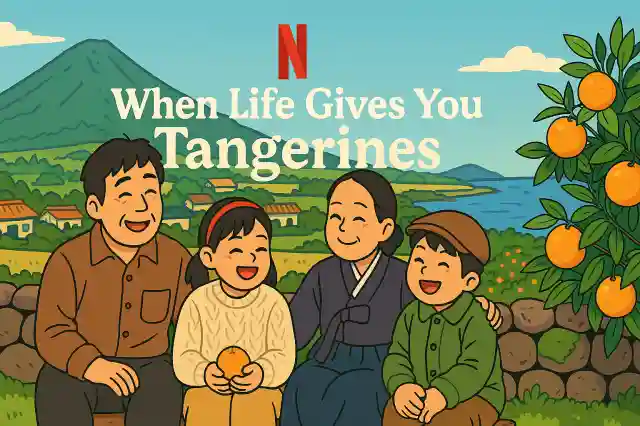Unraveling the Timeless Charm of Korean Dramas: A Closer Look at ‘When Life Gives You Tangerines’
In the ever-evolving landscape of media content, South Korean dramas have consistently captivated audiences with their rich storytelling, vibrant cultural settings, and heartfelt exploration of human emotions. One such recent standout is “When Life Gives You Tangerines,” known in Korean as “드라마 폭싹 속았수다,” which translates to “Thank You for Your Hard Work” in the Jeju dialect. Premiering on Netflix in March 2025, this romance and slice-of-life drama has garnered significant attention for its poignant portrayal of life on Jeju Island, delving into themes of love, family, and resilience across decades.
The series, starring IU and Park Bo-gum as the young protagonists, alongside Moon So-ri and Park Hae-joon in their later years, offers a sweeping narrative that spans generations. Set against the stunning backdrop of Jeju and Andong, “When Life Gives You Tangerines” not only tells a captivating story but also celebrates the unique cultural heritage of Korea.
Key Insights
- Cultural Authenticity: The drama’s use of the Jeju dialect and exploration of unique cultural practices highlight the importance of staying true to one’s cultural roots.
- Emotional Storytelling: By focusing on character-driven narratives and emotional arcs, creators can build a strong connection with viewers, making the content more relatable and impactful.
- Nostalgia and Universality: The series leverages nostalgia effectively, blending past and present to create a sense of universality that appeals to both older and younger audiences.
Table of Contents
Introduction
South Korean dramas have captivated audiences worldwide with their engaging narratives, vibrant settings, and exploration of human emotions. “When Life Gives You Tangerines” is a recent standout, premiering on Netflix in March 2025. This drama explores themes of love, family, and resilience across decades, set against the backdrop of Jeju Island.
Practical Implications
For media content creators, “When Life Gives You Tangerines” offers valuable lessons on crafting engaging narratives. The series highlights the importance of cultural authenticity, emotional storytelling, and leveraging nostalgia to create universality.
1. Cultural Authenticity
The drama’s use of the Jeju dialect and exploration of unique cultural practices demonstrate the value of staying true to one’s cultural roots. This approach enhances the narrative’s depth and appeal by incorporating authentic cultural elements into storytelling.
2. Emotional Storytelling
By focusing on character-driven narratives and emotional arcs, creators can build a strong connection with viewers, making the content more relatable and impactful. Emotional storytelling is a critical factor in engaging audiences.
3. Nostalgia and Universality
The series effectively blends past and present to create a sense of universality that appeals to both older and younger audiences. This approach allows the drama to transcend generations, making it timeless and appealing.
Broader Trends in Korean Dramas
Korean dramas have experienced a surge in global popularity, with many series gaining widespread acclaim for their storytelling, direction, and cultural impact. “When Life Gives You Tangerines” fits into this broader trend, reflecting themes and storytelling styles that have made Korean dramas so successful worldwide.
1. Cultural Celebration
Korean dramas often celebrate the country’s rich cultural heritage, using settings and narratives that highlight unique aspects of Korean life. This cultural focus appeals to both domestic and international audiences, fostering cross-cultural understanding and appreciation.
2. Emotional Depth
Another hallmark of Korean dramas is their ability to explore deep emotional themes. Series like Reply 1988 and Crash Landing on You have been praised for their nuanced portrayal of human emotions, making them relatable and engaging for global audiences.
3. Nostalgia and Historical Context
Many successful Korean dramas incorporate historical elements or nostalgic settings, which serve to educate viewers about Korea’s past while also providing a backdrop for compelling stories. This blend of history and fiction allows dramas to connect with audiences on multiple levels, enhancing their appeal and impact.



